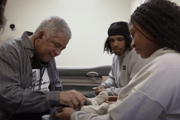Could this overlooked blood test help catch cancer early? Here’s what doctors want you to know
By
Veronica E.
- Replies 0
Disclaimer: The information provided in this article is for educational purposes only and is not intended as a substitute for professional medical advice, diagnosis, or treatment. Always consult your physician or other qualified healthcare providers with any questions you may have regarding a medical condition or before making any changes to your health regimen.
Most of us aren’t exactly thrilled about doctor’s appointments—especially the routine kind.
But sometimes, those basic checkups include tools that can quietly catch problems before they become serious.
In fact, there’s one simple and commonly available test that may offer early clues about cancer—yet many people don’t even know to ask for it.
While it’s not a replacement for standard screenings, it could help you and your doctor spot something worth a second look.
Let’s explore what this test is, how it works, and when it might be worth adding to your health checklist.

Why do so many skip important screenings?
According to a 2024 Aflac survey, nearly 60% of Americans have skipped a recommended health screening—a sharp increase of 20% from the year before.
While younger adults were the most likely to delay care, older adults also sometimes avoid screenings due to fear, confusion, or simply putting it off.
But when it comes to cancer, early detection can make a world of difference.
What you don’t know really can hurt you.
Also read: This simple blood test could save your life–90% accurate in detecting colon cancer
Why early detection matters
Many forms of cancer develop quietly, without symptoms in the early stages.
That’s why keeping up with recommended screenings is so important.
The American Cancer Society suggests the following:
In addition to these targeted screenings, a CBC can be another helpful tool—especially for identifying blood cancers like leukemia or lymphoma.
Also read: Discover the life-saving blood test that could detect colorectal cancer early!
What is a CBC—and how can it help?
A complete blood count is a standard blood test that measures levels of red blood cells, white blood cells, and platelets.
It’s often part of a routine checkup or used to monitor ongoing health conditions.
But it can also signal when something is off.
According to Dr. Maryssa M.C. Miller, an internal medicine physician and registered dietitian, changes in blood cell counts can sometimes be an early warning sign. For example:
While a CBC can’t confirm a cancer diagnosis, it may raise warning signs that prompt more specific testing.
Also read: Are you at risk? The vital health test your doctor might be overlooking
When should you ask for a CBC?
A CBC isn’t necessary for every checkup.
Dr. Miller emphasizes that for otherwise healthy adults with no symptoms, routine CBCs aren’t likely to uncover anything serious—and could lead to unnecessary stress or further tests.
However, a CBC can be useful if:
For older adults, especially those with multiple health concerns, a doctor may recommend CBCs more frequently.
Where a CBC fits into cancer screening
It’s important to remember that a CBC doesn’t replace other standard cancer screenings.
Instead, it should be seen as a supportive tool—an extra layer of observation that, in the right situation, could prompt earlier intervention.
To stay proactive, keep these guidelines in mind:
Nobody wants to think about cancer—but avoiding the conversation won’t make the risk go away.
A CBC is a simple test that, when combined with age-appropriate screenings, could offer peace of mind or even catch something serious in its early stages.
Read next: A shocking mistake in the OR left her with lifelong consequences

So, have you ever had a CBC that revealed something unexpected? Do you know which cancer screenings are recommended for your age or health status? Or do you have tips for making those doctor appointments feel a little less intimidating?
We’d love to hear your experiences and questions in the comments below. At The GrayVine, we’re all about staying informed, staying curious, and supporting one another—because when it comes to health, awareness truly is one of our best defenses!
Most of us aren’t exactly thrilled about doctor’s appointments—especially the routine kind.
But sometimes, those basic checkups include tools that can quietly catch problems before they become serious.
In fact, there’s one simple and commonly available test that may offer early clues about cancer—yet many people don’t even know to ask for it.
While it’s not a replacement for standard screenings, it could help you and your doctor spot something worth a second look.
Let’s explore what this test is, how it works, and when it might be worth adding to your health checklist.

Routine blood work may offer early clues about serious health conditions—if you know what to look for. Image Source: Pexels / Photo By: Kaboompics.com.
Why do so many skip important screenings?
According to a 2024 Aflac survey, nearly 60% of Americans have skipped a recommended health screening—a sharp increase of 20% from the year before.
While younger adults were the most likely to delay care, older adults also sometimes avoid screenings due to fear, confusion, or simply putting it off.
But when it comes to cancer, early detection can make a world of difference.
What you don’t know really can hurt you.
Also read: This simple blood test could save your life–90% accurate in detecting colon cancer
Why early detection matters
Many forms of cancer develop quietly, without symptoms in the early stages.
That’s why keeping up with recommended screenings is so important.
The American Cancer Society suggests the following:
- In your 40s: Begin routine mammograms and colon cancer screenings.
- In your 50s: Add lung and prostate cancer screenings to the list.
- If you have a family history of cancer, your doctor may suggest starting earlier.
In addition to these targeted screenings, a CBC can be another helpful tool—especially for identifying blood cancers like leukemia or lymphoma.
Also read: Discover the life-saving blood test that could detect colorectal cancer early!
What is a CBC—and how can it help?
A complete blood count is a standard blood test that measures levels of red blood cells, white blood cells, and platelets.
It’s often part of a routine checkup or used to monitor ongoing health conditions.
But it can also signal when something is off.
According to Dr. Maryssa M.C. Miller, an internal medicine physician and registered dietitian, changes in blood cell counts can sometimes be an early warning sign. For example:
- Low red blood cells (anemia) might point to colon cancer.
- Abnormal white blood cell counts could indicate leukemia or lymphoma.
While a CBC can’t confirm a cancer diagnosis, it may raise warning signs that prompt more specific testing.
Also read: Are you at risk? The vital health test your doctor might be overlooking
When should you ask for a CBC?
A CBC isn’t necessary for every checkup.
Dr. Miller emphasizes that for otherwise healthy adults with no symptoms, routine CBCs aren’t likely to uncover anything serious—and could lead to unnecessary stress or further tests.
However, a CBC can be useful if:
- You’re feeling unwell without a clear cause (such as fatigue, unexplained weight loss, night sweats, or easy bruising).
- You’re managing a chronic illness or taking medications that affect the immune system.
- You’re undergoing chemotherapy or other treatments that impact blood cell production.
- You have a family history of blood-related cancers or other high-risk conditions.
For older adults, especially those with multiple health concerns, a doctor may recommend CBCs more frequently.
Where a CBC fits into cancer screening
It’s important to remember that a CBC doesn’t replace other standard cancer screenings.
Instead, it should be seen as a supportive tool—an extra layer of observation that, in the right situation, could prompt earlier intervention.
To stay proactive, keep these guidelines in mind:
- Review your family medical history with your doctor regularly.
- Follow the recommended screening schedule based on your age and risk profile.
- Don’t ignore new or persistent symptoms, even if they seem minor.
- Ask about a CBC if you’re experiencing unusual symptoms or are at elevated risk.
Nobody wants to think about cancer—but avoiding the conversation won’t make the risk go away.
A CBC is a simple test that, when combined with age-appropriate screenings, could offer peace of mind or even catch something serious in its early stages.
Read next: A shocking mistake in the OR left her with lifelong consequences
Key Takeaways
- Many people skip important health screenings, which can delay early cancer detection and worsen outcomes.
- A complete blood count (CBC) test, though often forgotten, can help pick up early signs of certain cancers like leukemia, lymphoma, and sometimes colon cancer.
- CBC tests are not recommended for healthy adults without symptoms, but should be considered if you’re experiencing unexplained symptoms or have higher risk factors.
- Screening decisions, including when to get a CBC, should be tailored to your health history and family risk, and discussed with your healthcare provider.
So, have you ever had a CBC that revealed something unexpected? Do you know which cancer screenings are recommended for your age or health status? Or do you have tips for making those doctor appointments feel a little less intimidating?
We’d love to hear your experiences and questions in the comments below. At The GrayVine, we’re all about staying informed, staying curious, and supporting one another—because when it comes to health, awareness truly is one of our best defenses!






